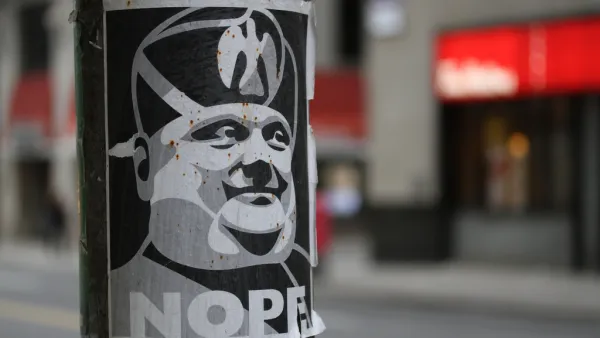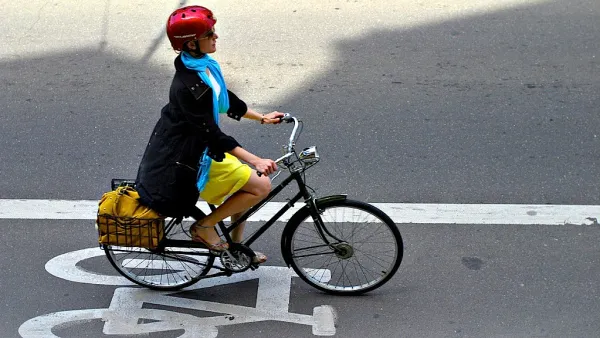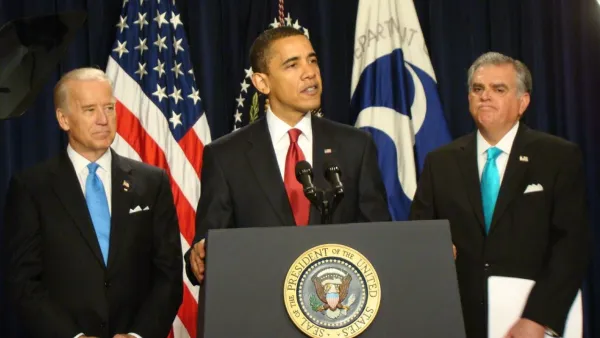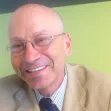Government / Politics
How to Unlock America's Bottom-Up Innovation
Thomas Friedman uses Chattanooga, Tenn. as an example of the "innovative thrust building, bottom-up, in the U.S. economy today." In an opinion piece for the Times, he urges leaders in Washington to help unlock America's embryonic growth surge.
15 Years Onward, What Has the Kyoto Protocol Done for the Planet?
Under the Kyoto Protocol, developed countries set targets for cutting carbon emissions relative to 1990 levels by 2012. As the globe gathers to discuss extending the expiring agreement, Duncan Clark examines its effectiveness.
Emulation is More than Flattery
We all have our role models in life. Never are they more pivotal than in the visioning required for placemaking. Failing to have patterns that perform economically, socially, and environmentally is a critical mistake says Nathan Morris.
Time Takes Toll on Loyal Opposition to Atlantic Yards
A decade of relentless, and exhausting, opposition by those "who saw democracy being trampled in the interest of a developer whose methodology they found offensive," has taken its toll on the ranks of opponents to Brooklyn's Atlantic Yards project.
D.C. Limits Parking to Promote Bicycling and Transit
As part of a broader effort to encourage less vehicular traffic city-wide, D.C. is expanding permit parking and reducing on-street parking in some of the city's most crowded neighborhoods. Not all are happy with the changes, reports Tim Craig.
NYC Studies How to Build Resiliency
In the wake of Superstorm Sandy, a new task force convened by New York's Mayor Michael R. Bloomberg and City Council speaker Christine C. Quinn will look into potential changes to the city's building code, with recommendations due next summer.

Controversial Toronto Mayor Removed From Office
After two years of making enemies in the city's planning, design, and transit communities, Toronto's Mayor Rob Ford has been given the boot for violating the city's conflict-of-interest law.
Jockeying for a Gas Tax Increase from Fiscal Cliff Talks
It could be a win-win: Reducing the deficit, stimulating job creation, and avoiding the dreaded 'fiscal cliff'. Those pushing for a gas tax increase have joined other industries in using the need to raise and/or cut $500 billion to avoid recession.
Fracking Debate Shifts To $
The public is increasingly showing support for hydraulic fracturing of oil and gas - and it's reflected at the ballot box as many pro-drilling candidates were elected. In fact, the debate has shifted from banning to what to do with new tax revenue.
The Steps to Creating a Meaningful Vision
In the three steps of placemaking, crafting a meaningful vision is the first and most straightforward, yet it's the most under-leveraged. Continuing his series on "Municipal Placemaking Mistakes," Nathan Norris describes how to get it right.

Pittsburgh Asks Cyclists, Drivers and Pedestrians to Play Nice Together
Looking at public commentary following a spate of recent bicyclist accidents and incidents, Annie Siebert considers some of issues that Pittsburghers face as drivers, cyclists and pedestrians sharing the road.
Carbon Emissions Now Have a Price - in California
It's official - for large industrial sources in California, the cost for emitting a ton of carbon dioxide or equivalent is $10.09 - nine cents above the minimum price set by the Air Board. That was the price paid at the first auction on Nov. 14.
Bring Your Own Bag in Delhi
Every year, Delhi produces 250,000 tons of plastic waste. Starting on November 23, the city government "will begin enforcing a ban on the manufacture, import, sale, storage and use of plastic bags, sheets, films or tubs," reports Raksha Kumar.

Leave Transit Projects to Transit Experts, Not Politicians
Stephen Smith sheds light on the problems of leadership holding back Obama's dream of high-speed rail.
How Can Architects Help in Disaster Relief?
Using post-Sandy New York as a case study, C.J. Hughes looks at the extent to which architects can be helpful in the immediate aftermath of a natural disaster.
Selling the Importance of Street Vending
In the latest entry in a series on informal urban livelihoods, Sally Roever of WIEGO provides insight into how planners can better understand, acknowledge and manage street vending through the development of appropriate policies and best practices.
With a Little Help From Their Dutch Friends, Could New York Become New Amsterdam?
“In recent days, the Netherlands’ peerless expertise and centuries of experience in battling water have been widely hailed in the United States as offering lessons" for New York and for other cities alike, writes Andrew Higgins.
'Climate Dividend' Proposed for California Utility Customers
California residential utility customers will receive a 'climate dividend', about $30 twice a year as part of the nation's first comprehensive 'cap & trade' program if the CA Public Utility Commission accepts a staff proposal at its Dec. 20 meeting,
Challenging the Rush to Rebuild
Justin Gillis outlines some harsh criticisms of disaster response efforts that rebuild without rethinking – and how much it's costing taxpayers across the country.
L.A. Moves to Curb Parking's 'Wild West'
Ever wonder what happens to your car after you hand it to a valet? You probably don't want to know the answer. A new ordinance to be considered by L.A.'s City Council may finally rein in "the wild, wild West at our curbs."
Pagination
Urban Design for Planners 1: Software Tools
This six-course series explores essential urban design concepts using open source software and equips planners with the tools they need to participate fully in the urban design process.
Planning for Universal Design
Learn the tools for implementing Universal Design in planning regulations.
EMC Planning Group, Inc.
Planetizen
Planetizen
Mpact (formerly Rail~Volution)
Great Falls Development Authority, Inc.
HUDs Office of Policy Development and Research
NYU Wagner Graduate School of Public Service


































